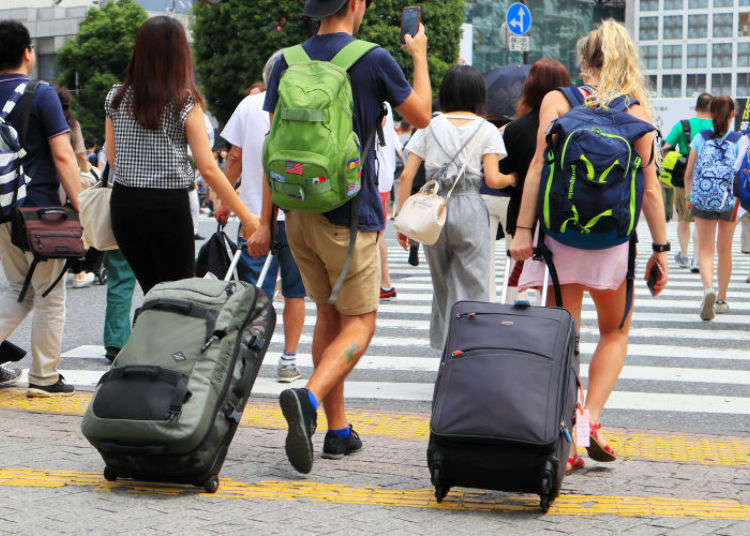
If you enjoy the convenience of Tokyo but want a taste of the simple life, there are plenty of destinations that can be explored on a day trip from Tokyo. This guide will give you the lowdown on what to bring, how to prepare and tips on making the most of your stay, plus provide recommended destinations to try outside Tokyo’s hustle and bustle. Read on!
Where to go
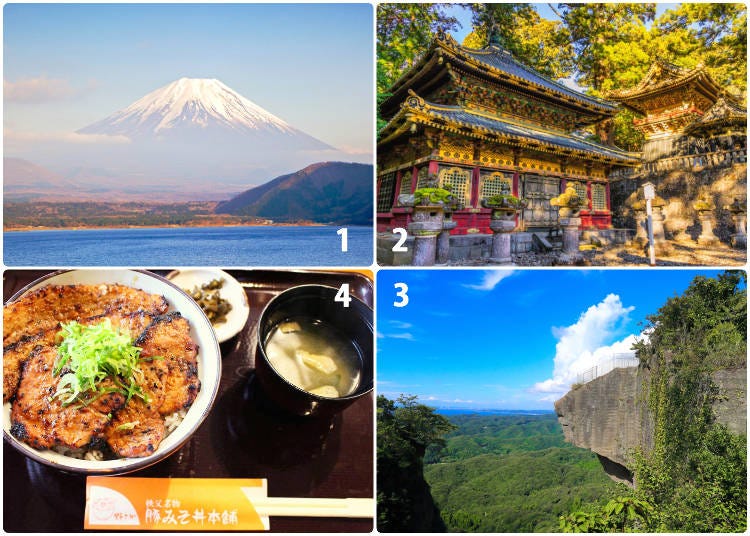
The bustling metropolis of Tokyo stretches from Tokyo Bay in the east to the Okutama Mountains in the west. Beyond these mountains lies Yamanashi Prefecture. You’ll find Kanagawa Prefecture in the south, Saitama Prefecture in the north and Chiba Prefecture in the East. You can even find tropical islands in Tokyo! Therefore, you don’t have to go far if you want to do some exploring outside the concrete jungle of central Tokyo.
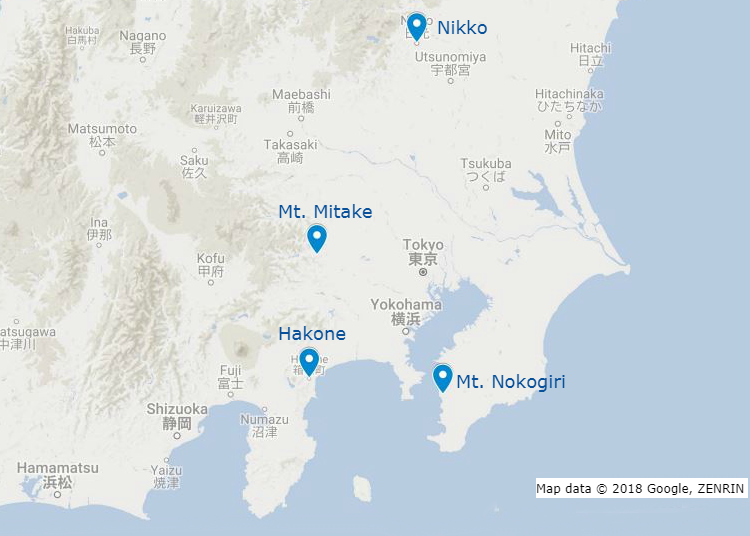
Here a few rustic destinations within reach from Tokyo:
For hiking aficionados, the sacred mountain of Mount Mitake within Chichibu-Tama-Kai National Park has numerous trails leading to Musashi Mitake Shrine.
Adventure seekers will love Nokogiriyama in Chiba Prefecture. Directly translated as “Saw Mountain,” Nokogiriyama is home to Japan’s largest Buddha and offers a spectacular look into hell at a jagged overhang known as “Jigoku-Nozoki.”
For spectacular views of the ever majestic Mount Fuji, breathtaking views of nature, and hot springs relaxation, head to Hakone in Kanagawa Prefecture.
Nikko, in Tochigi Prefecture, is famous for the beautifully crafted Toshogu Shrine dedicated to the first Tokugawa Shogunate, Tokugawa Ieyasu. You might also recognize this shrine as the one with the “Three Wise Monkeys!
What To Take On Your Journey
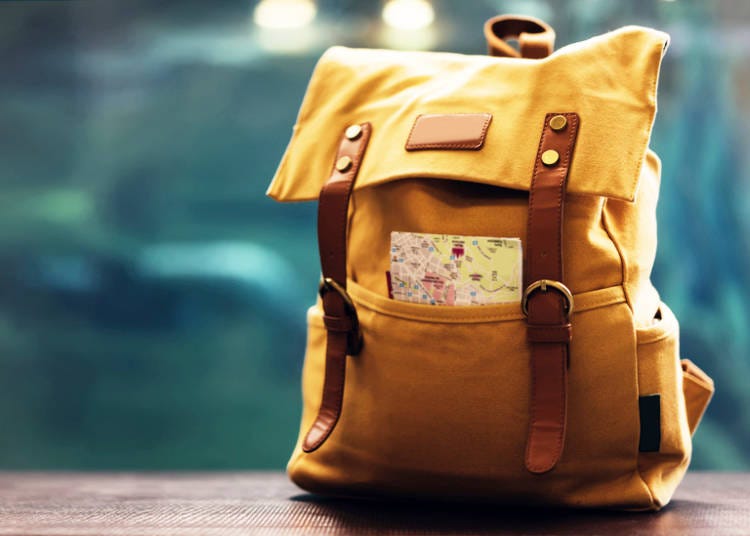
When planning a day trip within the Kanto region, you will likely find the same comforts and convenience of central Tokyo. Nevertheless, it’s always a good idea to be prepared.
Familiarize yourself with how to buy a bus or train ticket. You’ll definitely want a map to navigate your way, so grab one at the train station or use an app like Google Maps or Hyperdia for making your way to your destination.
Make sure you have a fully charged portable battery for charging your electronic devices as well as your pocket Wi-Fi router. Japan is making great strides in its efforts to keep travelers connected with reliable Wi-Fi during their stay, however bear in mind that if you’re out in the countryside you’ll likely find public Wi-Fi hard to come by.
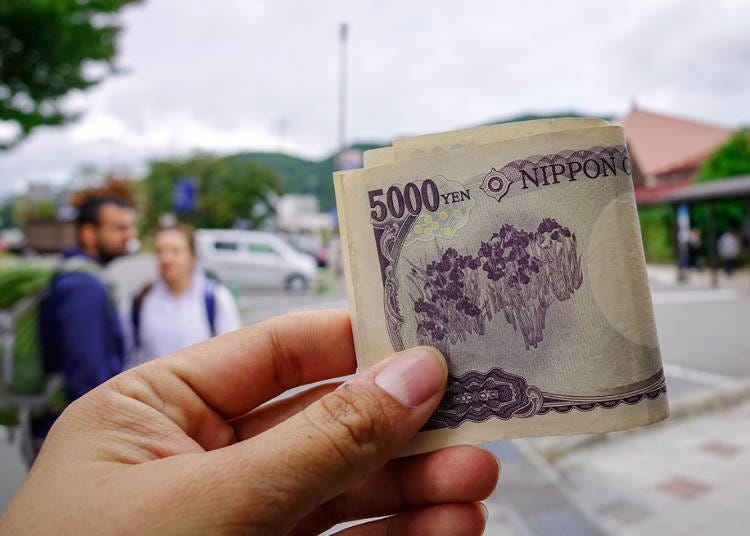
There’s no need to fumble with loose change when boarding a bus if you’ve precharged your electronic Pasmo or Suica IC card. However, small independently run shops and food stalls may not accept electronic money or credit cards.
Therefore, it’s best to have loose change or a few bills on hand. We suggest bringing around 30,000 yen to purchase snacks, souvenirs. It may seem excessive but it’s best to have spare cash on hand to cover unexpected things like taxi fare, staying overnight or even a hospital visit.
Also, depending on the season, consider bringing the following, which can be found at most convenience stores or drugstores:
・ Compact umbrella (oritatami kasa / 折りたたみ傘)
・ Sunscreen (hiyakedome / 日焼け止め)
・ Insect repellent (mushi yoke / 虫除け)
・ Hand warmers (kairo / カイロ)
On your way to the station, head to the convenience store for drinks and snacks to munch on during your train or bus ride!
Upon Arrival
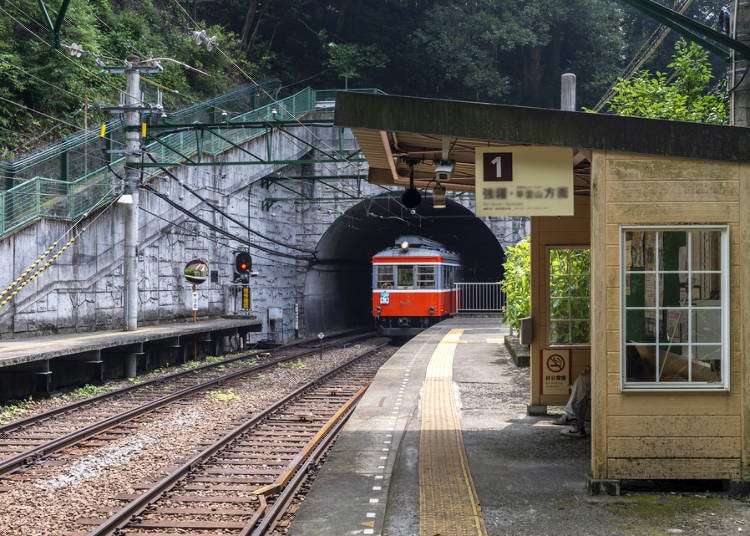
When you arrive at your destination, you may be eager to start exploring, but following these tips can prevent your day trip from turning into a disaster.
Some train stations do not have a station master or staff. While unmanned stations may be a novel concept to you, do know what you are expected to pay for your fare just as you would at a standard train station.
If there are staff present at your station, use the opportunity to ask them for directions on getting to your destination! Just say, maigo ni narashita. Annai shite moraemasen ka? (I’m lost. Could you help me?)
There may also be a tourist center or kiosk nearby where you can ask for directions and grab a few maps and brochures.
Plan Your Return Trip To Tokyo

Be sure to take photos of the kanji for your station or bus stop. This is particularly helpful with bus stops, as not all signs feature English, let alone text to assist in reading Japanese characters.
It is also a good idea to take a photo of the train or bus schedule so that you will know when you’ll need to return to the train station or bus stop. In certain areas, the amount of buses or trains may not come as frequently as they do in Tokyo.
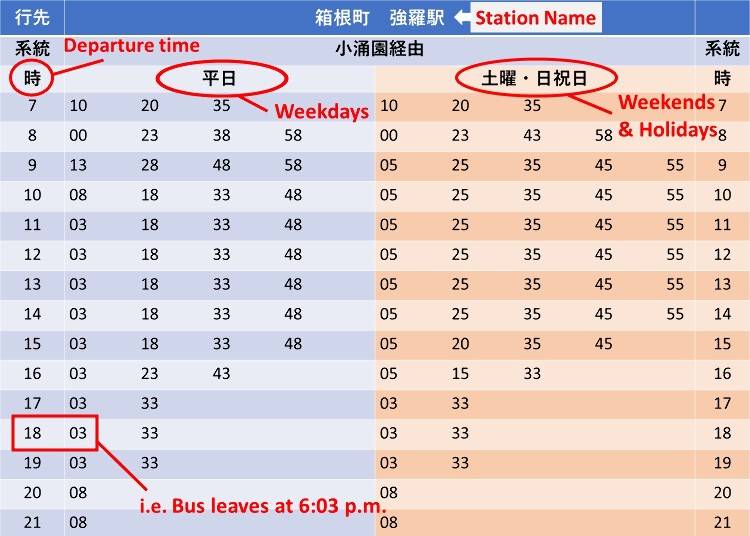
You should also note that bus and trains in Japan typically operate on two different schedules, a weekday (平日) schedule and a weekend/holiday (土日休) schedule. You may also find a schedules featuring three time tables: weekday (平日), Saturday (土曜), and Sunday/holiday (日曜・休日).
Set an alarm on your phone or portable device as reminder to let you know when it’s time to head back to the train station or bus stop. This tip will especially come in handy if you plan to return to Tokyo on the last train or bus.
Take a Short Break
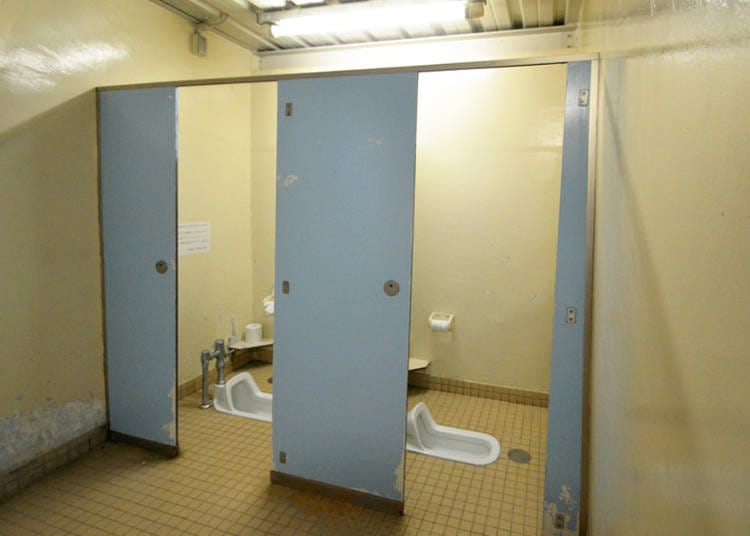
Be sure to go to the bathroom when arriving at a train station or when you see a convenience store. Public toilets may be few and far in between en route to your final destination.
Likewise, you are sure to encounter Japanese-style squat toilets. Rather than be alarmed or inconvenienced, see it as an opportunity to experience Japanese culture!
Lastly, be sure to dispose of your trash (empty bottles, snack wrappers, bento boxes) when you arrive at your train station so that you will not have to carry it. There’s sure to be a vending machine at your station so buy a few drinks
Make the Most of Your Stay
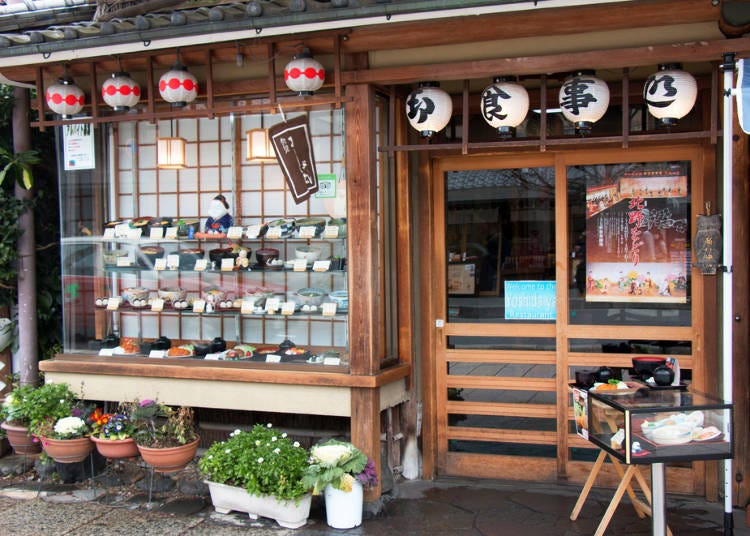
Note that some restaurants and cafes and shops, may close for a few hours midday. Familiarize yourself with these kanji: 営業中 (eigyouchuu) means “we’re open” while 準備中(junbichuu) means “in preparation (for lunch/dinner) service.”
Don’t let menus written only in Japanese intimate you! Many times these restaurants will give you an authentic Japanese experience that you can’t find in Tokyo!
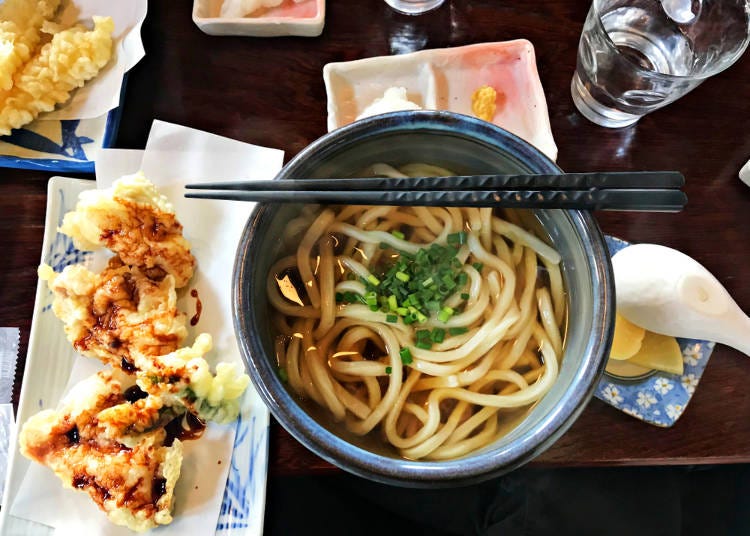
To get the chef’s recommendations, ask Osusume wa nan desu ka? (What do you recommend?). If you’re feeling adventurous, say Ninki no ryori o onegai shimasu which means “I’ll have what’s popular here.”
Use this opportunity to chat with locals or even ask for directions.
Enjoy your day trip from Tokyo!
*Prices and options mentioned are subject to change.
*Unless stated otherwise, all prices include tax.
Popular Tours & Activitiess
Recommended places for you
-

Jukuseiniku-to Namamottsuarera Nikubaru Italian Nikutaria Sannomiya
Izakaya
Kobe, Sannomiya, Kitano
-
Appealing

Rukku and Uohei
Izakaya
Sapporo / Chitose
-
Goods

Yoshida Gennojo-Roho Kyoto Buddhist Altars
Gift Shops
Nijo Castle, Kyoto Imperial Palace
-

Kanzenkoshitsuyakinikutabehodai Gyugyu Paradise Sannomiya
Yakiniku
Kobe, Sannomiya, Kitano
-

Kambei Sannomiyahonten
Yakiniku
Kobe, Sannomiya, Kitano
-

ISHIDAYA Hanare
Yakiniku
Kobe, Sannomiya, Kitano
-

How to Get Don Quijote's Exclusive 2025-2026 Winter Gift (+Tax-Free Savings)
-

New in Ginza! Air BicCamera Ginza Opens with a Faster, More Convenient Shopping Experience
by: Guest Contributor
-
Ad

(Opening in Jan 2026) 'THE SUMO LIVE RESTAURANT HIRAKUZA GINZA TOKYO!' 5 Exciting Ways to Experience the World of Sumo!
-

First Japan Cherry Blossom 2026 Forecast Announced! Here's When & Where to See Sakura in Japan
-

This Winter, Godzilla Takes Over Haneda Airport
by: Guest Contributor
-
Ad

Discover the "Miraculous Forest" in the Heart of Tokyo: The Institute for Nature Study (9 Minutes from JR Meguro Station)
-

The Best of Japan: 11 Major Cities Every Traveler Should Visit
-

Tokyo Cosplay! Makeup, & Dress Up Experience at Akihabara's Studio Crown
-

Popular Food at Universal Studios Japan
by: WESTPLAN
-

16 Secrets About Mt. Fuji, the Symbol of Japan: Even Japanese People Don’t Know That?!
-

Top 3 Photo Spots at Tokyo Station
-

Enjoy Kyoto Nightlife! 3 Kyoto Clubs Recommended for Foreign Visitors
by: WESTPLAN
- #best sushi japan
- #what to do in odaiba
- #what to bring to japan
- #new years in tokyo
- #best ramen japan
- #what to buy in ameyoko
- #japanese nail trends
- #things to do japan
- #onsen tattoo friendly tokyo
- #daiso
- #best coffee japan
- #best japanese soft drinks
- #best yakiniku japan
- #japanese fashion culture
- #japanese convenience store snacks












